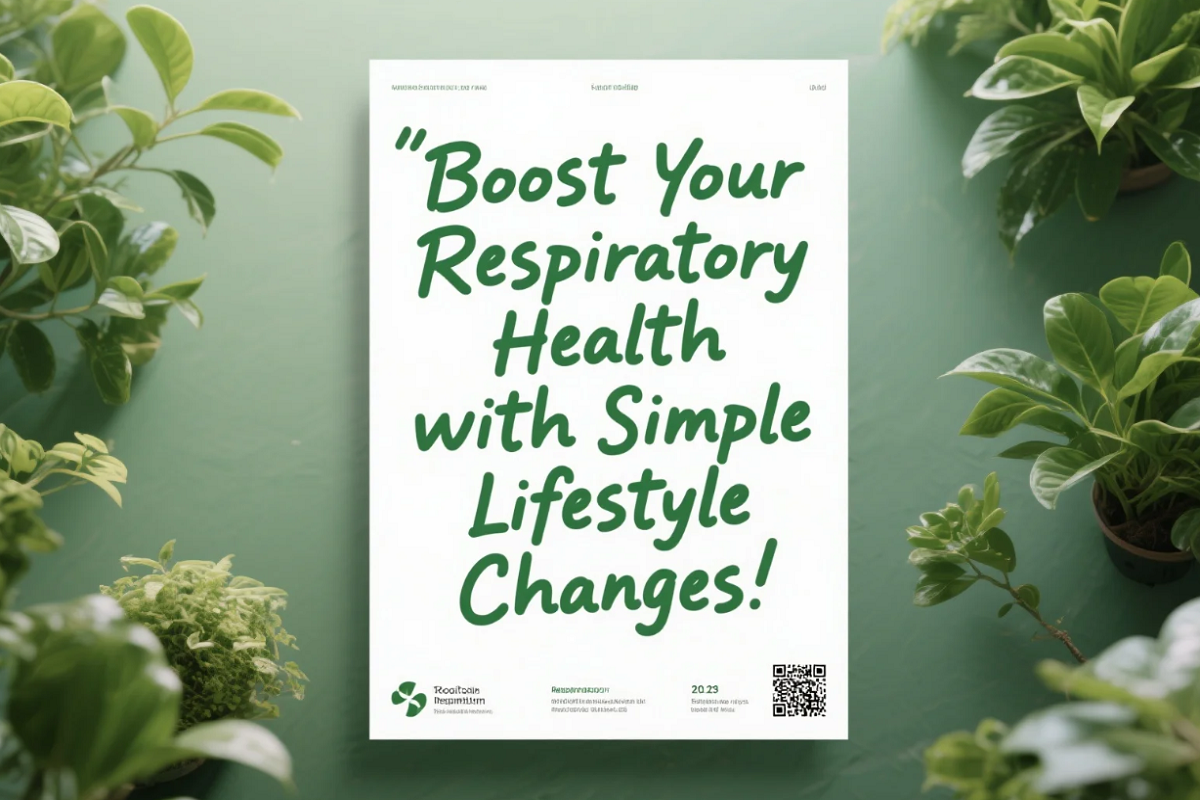How to Improve Respiratory Health and Breathe Without Limits
-
113
- 18 Mar, 2025

Imagine waking up every morning and taking a deep, full breath, feeling the air fill your lungs without any discomfort. For many, this simple act can be a challenge, whether due to environmental factors, lifestyle choices, or underlying respiratory conditions. But the truth is, improving respiratory health is within your reach. With the right habits and practices, you can breathe without limits and enjoy enhanced vitality and overall well-being.
In this article, we’ll explore practical and effective ways to improve your respiratory health. Whether you're looking to boost your lung capacity, prevent breathing difficulties, or reduce your risk of respiratory diseases, this guide will provide the insights you need to take control of your breathing.
Why Respiratory Health Matters
Your respiratory system is crucial to your body’s overall function. It supplies oxygen to your bloodstream, which is vital for energy production, and it removes carbon dioxide, a waste product of metabolism. Poor respiratory health can lead to a variety of issues, ranging from shortness of breath and fatigue to more serious conditions such as asthma, chronic obstructive pulmonary disease (COPD), and emphysema.
Taking proactive steps to maintain or improve respiratory health not only helps you breathe easier but also enhances your quality of life. Healthy lungs are essential for staying active, feeling energized, and living a longer, healthier life.
1. Stay Active: Exercise for Better Lung Health
One of the most effective ways to improve respiratory health is by staying physically active. Regular exercise helps strengthen the muscles involved in breathing and increases lung capacity. It also promotes better circulation, helping oxygen reach your cells more efficiently.
How Exercise Helps:
Boosts lung capacity: Aerobic exercises like running, swimming, or cycling increase your lung volume, allowing your lungs to hold more air and deliver oxygen more effectively.
Strengthens respiratory muscles: Breathing exercises and yoga can improve diaphragm strength and overall lung function.
Enhances blood circulation: This helps your body distribute oxygen more efficiently to tissues and organs, reducing the strain on your respiratory system.
Types of Exercises to Improve Respiratory Health:
Cardio workouts: Running, cycling, brisk walking, swimming
Yoga: Poses like the child’s pose, cobra, and breathing exercises like pranayama can help expand lung capacity and promote relaxed, deeper breathing.
Strength training: Building muscle strength also supports better posture, which can lead to improved lung function.
Try to get at least 30 minutes of moderate exercise on five days each week. This can be broken down into smaller sessions if necessary.
2. Practice Deep Breathing Techniques
Sometimes, we forget how to breathe properly. Shallow breathing, often triggered by stress or poor posture, can limit the efficiency of your lungs. Practicing deep breathing techniques regularly can help improve lung capacity, reduce stress, and promote better oxygen intake.
Breathing Exercises to Try:
Diaphragmatic breathing (abdominal breathing): This involves breathing deeply into your abdomen, allowing your diaphragm to fully expand. This technique increases the oxygen supply to your lungs and strengthens the diaphragm muscle.
How to practice: Lie down or sit up straight, place one hand on your chest and the other on your abdomen, and breathe in deeply through your nose, letting your abdomen rise. Exhale slowly through your mouth.
Pursed-lip breathing: This exercise helps you breathe more slowly and effectively. It’s especially useful for those with respiratory conditions like COPD.
How to practice: Inhale slowly through your nose for 2 counts, then exhale slowly through pursed lips for 4 counts.
Box breathing: Used often for relaxation, box breathing is a simple technique that helps regulate breath and oxygen intake.
How to practice: Inhale for 4 counts, hold your breath for 4 counts, exhale for 4 counts, and hold your breath again for 4 counts. Repeat several times.
Benefits of Deep Breathing:
- Improves oxygenation throughout your body.
- Reduces stress and anxiety, which can directly affect your lung health.
- Promotes better airflow by helping open up the airways.
3. Maintain a Healthy Diet for Respiratory Health
What you eat directly affects your respiratory health. A well-balanced, nutrient-rich diet provides the vitamins and minerals necessary for lung function and can help prevent respiratory diseases.
Key Nutrients for Lung Health:
Vitamin C: This antioxidant supports the immune system and helps protect the lungs from oxidative damage. Sources: citrus fruits, strawberries, bell peppers, broccoli.
Omega-3 fatty acids: These healthy fats reduce inflammation and improve lung function. Examples include fatty fish such as salmon, walnuts, and flaxseeds.
Vitamin D: Helps in maintaining healthy lung tissue and reducing the risk of respiratory infections. Sources include sunlight, fortified milk, eggs, and fatty fish.
Magnesium: This mineral helps relax the muscles around the airways, making it easier to breathe. Examples include leafy greens, nuts, seeds, and whole grains.
Foods to Avoid:
Processed foods: These can contribute to inflammation in the body, potentially worsening respiratory conditions like asthma or COPD.
Excessive salt and sugar: Too much salt can increase the risk of fluid retention in the lungs, while excess sugar can contribute to inflammation.
4. Avoid Smoking and Environmental Pollutants
One of the most significant threats to respiratory health is smoking, as it damages the lungs and increases the risk of chronic respiratory diseases. Even second-hand smoke and exposure to pollutants in the environment can be harmful.
Tips to Protect Your Lungs:
Quit smoking: If you’re a smoker, quitting is the single most important thing you can do for your respiratory health. Consider professional help or smoking cessation programs if needed.
Limit exposure to pollution: Avoid areas with high levels of air pollution, such as busy streets or industrial zones, and try to stay indoors on days when air quality is poor.
Use an air purifier: Consider using an air purifier in your home to filter out allergens, dust, and pollutants that may compromise your lungs.
Wear a mask: If you work in an environment with harmful particles, such as a factory or construction site, use a proper mask to protect your lungs.
5. Keep Your Environment Clean
A clean, well-ventilated environment plays a vital role in maintaining respiratory health. Dust, mold, pet dander, and other allergens can exacerbate breathing problems, especially in individuals with asthma or allergies.
Ways to Improve Indoor Air Quality:
Regular cleaning: Dust and vacuum regularly, especially in places like carpets, upholstery, and air vents.
Humidity control: Keep humidity levels in check (around 30-50%) to prevent the growth of mold. Consider using a dehumidifier in damp areas.
Ventilation: Open windows when possible to allow fresh air to circulate, especially when cooking or using cleaning products.
6. Manage Stress and Mental Health
Stress can have a significant impact on respiratory health, as it can lead to shallow breathing, increase inflammation, and worsen conditions like asthma. Managing stress effectively not only helps you breathe better but also contributes to your overall health.
Stress Management Techniques:
Mindfulness meditation: Practicing mindfulness can help you relax, reduce stress, and improve your breathing.
Progressive muscle relaxation: Tensing and then relaxing different muscle groups can help you feel more relaxed and encourage deeper breathing.
Regular physical activity: Exercise, as mentioned earlier, is not only great for your body but also for your mind, reducing stress and promoting better breathing.
Breathe Without Limits
Improving your respiratory health is not a one-time effort but a lifelong commitment to healthy habits and self-care. By staying active, practicing deep breathing, maintaining a healthy diet, avoiding environmental pollutants, and managing stress, you can help your lungs function optimally and breathe freely without limitations.
Taking steps today to care for your lungs will pay off in the long run, leading to better overall health and a higher quality of life. Start with small changes, and soon you’ll be breathing more easily, feeling more energized, and experiencing the full benefits of healthy, unrestricted respiration.










